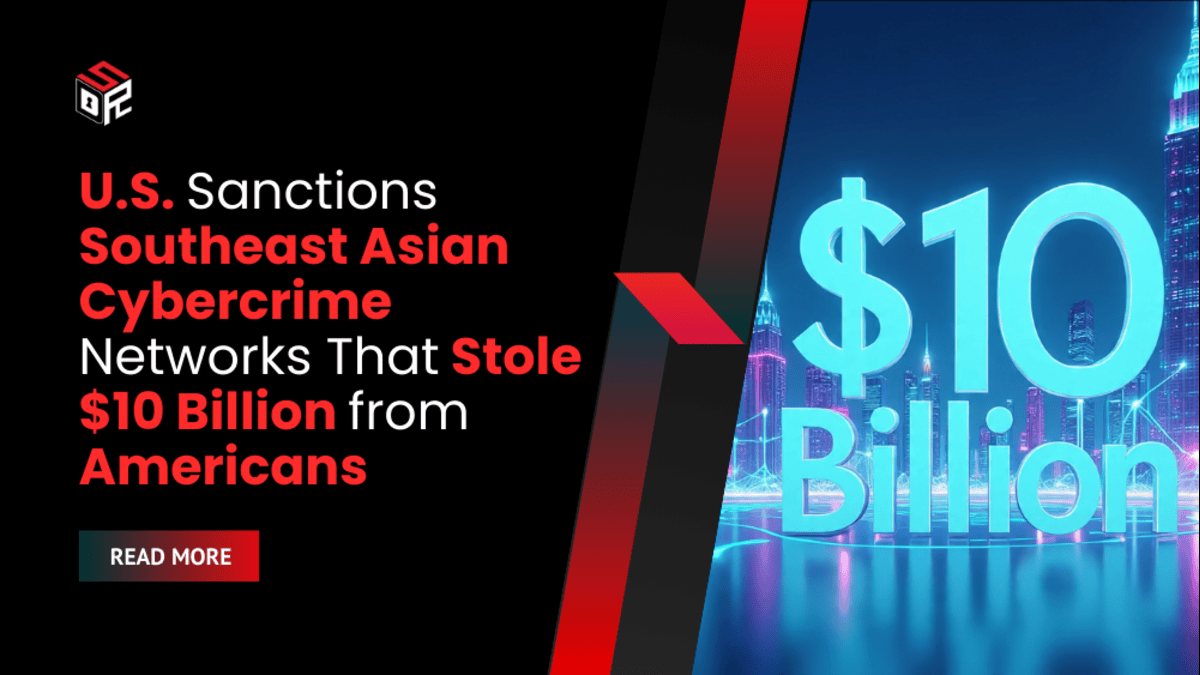The U.S. Department of the Treasury has taken sweeping action against large-scale cybercrime networks operating across Southeast Asia after they collectively defrauded Americans of more than $10 billion in 2024.
Cybercrime Networks Linked to Forced Labor and Human Trafficking
These operations — concentrated in Burma (Myanmar) and Cambodia — are not just online scam hubs. U.S. officials describe them as “modern slavery farms,” using forced labor, human trafficking, and physical violence to run industrial-scale fraud campaigns.
The scams range from romance scams designed to lure victims into fake relationships to elaborate cryptocurrency investment frauds. According to Treasury data, losses tied to these scam operations jumped 66% in 2024 compared to the previous year — highlighting a dramatic surge in activity.
OFAC Identifies Key Targets Behind the Operations
The Treasury’s Office of Foreign Assets Control (OFAC) has sanctioned 19 individuals and entities tied to these schemes — nine in Burma linked to the Karen National Army (KNA) and 10 connected to organized crime groups in Cambodia.
Key sanctioned targets include:
- Tin Win – Owns property hosting scam centers and operates an energy company that powers these sites
- Saw Min Min Oo – KNA official overseeing affiliated companies involved in fraud operations
- Chit Linn Myaing Co., Ltd (CLM Co.) – KNA’s main holding company, partnered with Myanmar Yatai to support scam centers
- Chit Linn Myaing Toyota Company Limited – Supplies resources linked to scam site operations
- Chit Linn Myaing Mining & Industry Company Limited – Involved in scam-related activities tied to KNA
- Shwe Myint Thaung Yinn Industry & Manufacturing Company Limited – Contracts with energy suppliers to power fraud operations in Shwe Kokko
- She Zhijiang – The mastermind behind Yatai New City; arrested in Thailand on charges of human rights abuses
- Yatai International Holdings Group Limited – She Zhijiang’s main corporate entity, majority owner of Myanmar Yatai
- Myanmar Yatai International Holding Group Co., Ltd – Joint venture that owns and operates the Yatai New City scam compound
In Cambodia, the sanctions target:
- T C Capital Co. Ltd. – Owner of Golden Sun Sky Casino and Hotel, linked to crypto scams and laundering operations
- Dong Lecheng – T C Capital founder, convicted in China for money laundering
- K B Hotel Co. Ltd. – Operates a compound with office blocks, hotel, and casino, using forced labor
- Xu Aimin – Co-founder of K B Hotel, convicted for illegal gambling and money laundering
- K B X Investment Co. Ltd. – Cambodian real estate company owned by Xu
- Chen Al Len – Director of Heng He Bavet and board member of K B Hotel
- Su Liangsheng – Co-director of Heng He Bavet and board member of M D S Heng He
- Heng He Bavet Property Co. Ltd. – Owns Heng He Casino and facilitates forced labor and crypto scams
- M D S Heng He Investment Co. Ltd. – Developer of a scam compound in Pursat Province
- HH Bank Cambodia plc – A financial institution majority-owned by Chen and Su, supporting fraud-related transactions
Sanctions Target Financial and Operational Lifelines
The sanctions are enforced under multiple Executive Orders: 13851 (transnational crime), 13694 (cyber-enabled threats), 13818 (human rights abuses), and 14014 (destabilizing actors in Burma).
Practically, these measures:
- Block sanctioned entities from the U.S. financial system
- Freeze any property or assets they hold in the United States
- Prohibit all financial transactions with American citizens or businesses
- Sever their access to international banking, investment partners, and online platforms
This financial pressure aims to cripple the infrastructure of these cybercrime operations, making it more difficult for them to launder money or finance fraudulent campaigns.
Sanctions Raise the Cost for Global Cybercrime
Although no arrests have been announced, the sanctions bring serious legal exposure and financial isolation to these actors. Experts note that even without direct law enforcement action, cutting off access to banking systems and technology platforms can significantly disrupt these scam networks.
The U.S. government continues to urge international partners to take coordinated action against cyber-enabled crime rings, especially those that use forced labor and violence to operate fraud schemes targeting victims worldwide.









